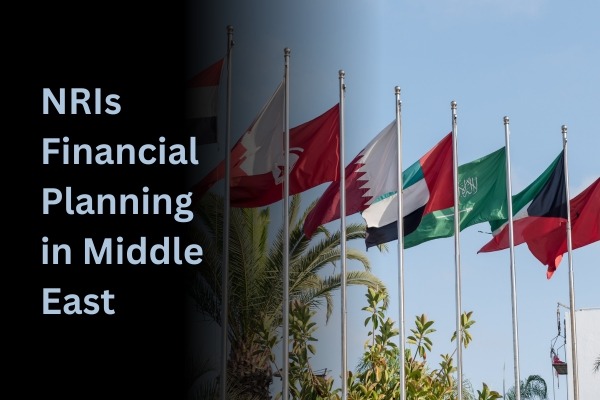NRIs Financial Planning in Middle East
With a vibrant economy and numerous employment opportunities, the Middle East has been a sought-after destination for Non-Resident Indians (NRIs) seeking better prospects and career growth. NRIs are individuals of Indian origin who reside outside India for various reasons, such as work, education, or personal preferences. They form a significant part of the global Indian diaspora, maintaining strong ties with their homeland while contributing to both the Middle Eastern and Indian economies.
NRIs play a crucial role in bridging economic and cultural ties between India and the Middle East. Their contributions through remittances, investments, and expertise have a profound impact on both regions, fostering economic growth and cultural exchange.
The Middle East is home to a significant population of NRIs, with countries such as the United Arab Emirates (UAE), Saudi Arabia, Qatar, Oman, and Bahrain being major hubs. These individuals come from diverse backgrounds, ranging from skilled professionals to entrepreneurs, making the region a melting pot of talent and aspirations.
NRIs in the GCC countries encounter a unique set of challenges in managing their finances. Adapting to a foreign financial landscape, dealing with currency exchange fluctuations, understanding complex tax regulations, and addressing cross-border legal considerations are just a few of the hurdles they must navigate. However, the region also offers numerous opportunities for wealth accumulation, diverse investment options, and access to a thriving business environment.
Understanding the Financial Landscape in the Middle East
Overview of the Middle Eastern Economy and Financial Markets
The Middle East boasts a diverse economic landscape, with some countries heavily reliant on oil and gas revenues, while others have diversified into sectors like finance, technology, and tourism. Understanding the dynamics of these economies is crucial for NRIs to make informed financial decisions.
Currency Exchange Considerations
NRIs often face currency exchange challenges while transferring funds to India or investing in foreign currencies. Exchange rate fluctuations can significantly impact the value of their remittances and investment returns. Being aware of hedging strategies and exchange rate trends is vital to mitigate risks.
Taxation Rules and Regulations for NRIs
NRIs must adhere to tax regulations in both their host country and India. Understanding their tax residency status, double taxation agreements, and reporting requirements is essential for optimizing tax efficiency and compliance.
Key Financial Goals for NRIs in the Middle East
Wealth Accumulation and Long-Term Financial Security
NRIs often prioritize wealth accumulation to achieve long-term financial security for themselves and their families. Balancing risk and return, they seek investment opportunities that offer capital appreciation and steady income streams.
Retirement Planning and Pension Options
Planning for retirement is a significant financial goal for NRIs. They evaluate retirement plans offered by their employers and explore individual retirement accounts to secure a comfortable post-retirement life.
Investment Opportunities and Risk Management
NRIs have access to diverse investment opportunities in the Middle East, ranging from real estate and equities to mutual funds and alternative investments. Balancing risk through diversification helps them optimize investment returns.
Asset Allocation and Diversification
Creating a well-balanced and diversified investment portfolio is paramount for NRIs to achieve their financial goals. Strategic asset allocation ensures they have exposure to different asset classes with varying risk levels.
Financial Planning Strategies
Budgeting and Managing Expenses
Sound financial planning begins with effective budgeting and expense management. NRIs should create budgets that align with their income, living costs, savings, and investment objectives.
Remittances and Cross-Border Money Transfers
NRIs need efficient and cost-effective remittance options to send money to India regularly. Careful consideration of transfer fees and foreign exchange costs is essential to maximize the value of their remittances.
Navigating the Local Banking System
Understanding the local banking system and its services is vital for NRIs to manage their finances effectively. They can explore NRI-specific accounts and investment opportunities to align with their financial needs.
Building a Diversified Investment Portfolio
NRIs can capitalize on the diverse investment options available in the Middle East. Investing in real estate, stocks, mutual funds, and alternative assets allows them to create a balanced and resilient investment portfolio.
Tax Planning and Compliance
Adhering to tax regulations in both their host country and India is crucial for NRIs. Seeking professional advice helps them optimize their tax liabilities while ensuring compliance with relevant tax laws.
Retirement Planning for NRIs
Understanding the Retirement Landscape in the Middle East
Retirement planning is a significant financial goal for NRIs in the Middle East. Understanding the retirement landscape in their host country is crucial, as it varies from nation to nation. Some Middle Eastern countries offer retirement benefits and pension schemes for expatriates, while others may not provide such provisions. NRIs must evaluate the available options and make informed decisions about their retirement savings.
Evaluating Pension Plans and Retirement Accounts
Employer-sponsored pension plans and retirement accounts play a vital role in retirement planning for NRIs. These plans often come with various features, contribution options, investment choices, and withdrawal rules. NRIs should carefully assess the benefits and limitations of such accounts to maximize their retirement savings.
Additional Retirement Savings and Investment Options
In addition to employer-sponsored plans, NRIs can explore individual retirement accounts and other voluntary contributions to supplement their retirement savings. They may also consider alternative investment vehicles designed for long-term growth and income during retirement.
Investment Opportunities for NRIs in the Middle East
Real Estate Investments and Property Ownership
The Middle East offers attractive opportunities for NRIs interested in real estate investments. Investing in residential or commercial properties can provide potential rental income and long-term appreciation, making real estate a popular asset class among NRIs.
Stock Market and Equities Investments
Participating in the Middle Eastern stock markets allows NRIs to gain exposure to various industries and sectors. However, investing in stocks requires careful research and analysis to align with their financial objectives and risk tolerance.
Mutual Funds and Investment Funds Available in the Region
Investment funds, such as mutual funds and exchange-traded funds (ETFs), provide NRIs with a diversified and professionally managed investment approach. Understanding the fees, track records, and underlying assets of these funds is crucial for informed decision-making.
Precious Metals and Alternative Investments
For NRIs seeking diversification, precious metals like gold and silver, as well as alternative investments such as private equity and hedge funds, can be considered. These assets may act as hedges against inflation and market volatility.
Risk Management and Insurance for NRIs
Health and Medical Insurance Considerations
Healthcare costs in the Middle East can be significant, and NRIs should prioritize obtaining comprehensive health insurance coverage for themselves and their families. Adequate health insurance ensures financial protection in the event of medical emergencies.
Life Insurance and Family Protection
Life insurance is essential for NRIs with financial dependents. It provides financial security to the family in case of the policyholder’s untimely demise. Evaluating various life insurance options and coverage amounts is crucial to meet family protection needs.
Mitigating Financial Risks and Uncertainties
NRIs should assess their risk tolerance and consider insurance and investment strategies that align with their risk profiles. Adequate risk management helps protect financial assets and minimizes potential losses due to unforeseen events.
Estate Planning and Wealth Transfer
Understanding Local Inheritance Laws and Regulations
NRIs need to be familiar with the inheritance laws and regulations in both their host country and India. Each jurisdiction may have distinct rules regarding asset distribution, which can impact estate planning decisions.
Creating a Comprehensive Estate Plan
Estate planning is essential for NRIs to ensure a smooth transfer of wealth to their beneficiaries. This involves preparing wills, establishing trusts, and designating beneficiaries for financial accounts and assets.
Establishing Trusts and Wills to Manage Assets and Legacy
By establishing trusts, NRIs gain greater control over their assets, protect their wealth, and provide for specific beneficiaries. Wills play a vital role in clarifying the distribution of assets and avoiding potential disputes.
Why Hiring a Financial Advisor is Important?
The Role of Financial Advisors in NRI Financial Planning
Financial planners for NRIs can offer personalized advice tailored to individual circumstances and goals. They help create comprehensive financial plans and monitor progress over time.
Selecting Reputable and Knowledgeable Professionals
When selecting financial advisors or tax consultants, NRIs should prioritize professionals with expertise in cross-border financial matters and in-depth knowledge of relevant regulations.
Reviewing and Monitoring Financial Plans Regularly
Financial planning is not a one-time activity; it requires periodic review and adjustments as circumstances change. Regularly reviewing and updating financial plans helps NRIs stay on track to achieve their goals.
For individuals and families residing in UAE, a financial advisor for NRIs in Dubai UAE can help navigate the complexities of financial planning. They provide expert guidance and advice to make informed decisions regarding savings, investments, insurance, tax planning, and more.
Conclusion
NRIs in the Middle East face a unique set of challenges and opportunities in their financial planning journey. By understanding the financial landscape, setting clear goals, and implementing effective strategies, NRIs can achieve their financial aspirations and secure a stable future for themselves and their families. Embracing continuous learning and adapting to changing circumstances are essential for navigating the dynamic financial landscape and thriving as NRIs in the Middle East. With access to various investment avenues, robust insurance options, and advancements in financial technology, NRIs are well-positioned to achieve financial success and make a lasting impact on both their host country and their beloved India.





